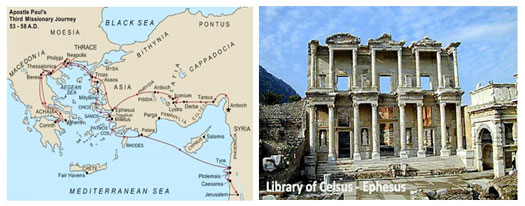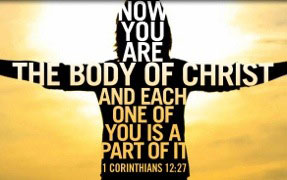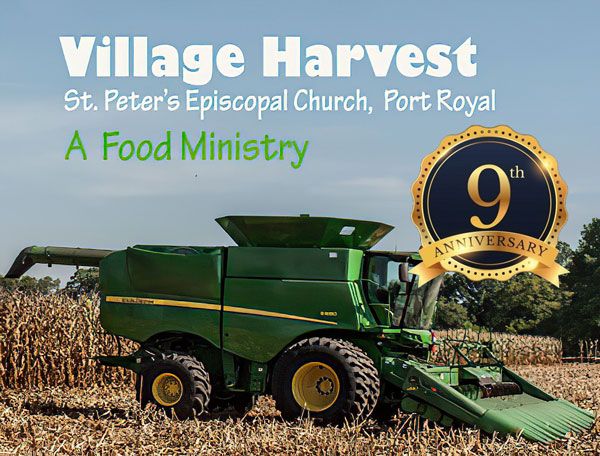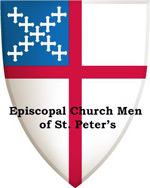Here are selections of three of them from 2020:
1. Hymn 680 – “O God, our help in ages past” (40 seconds)
2. Hymn 9 – “Awake Awake” (48 seconds)
3. Hymn 490 “I want to walk as a child of the light” (55 seconds)
St. Peter's Episcopal Church, Port Royal, VA

We are a small Episcopal Church on the banks of the Rappahannock in Port Royal, Virginia. We acknowledge that we gather on the traditional land of the first people of Port Royal, the Nandtaughtacund, and we respect and honor with gratitude the land itself, the legacy of the ancestors, and the life of the Rappahannock Tribe. Our mission statement is to do God’s Will in all that we do.
Here are selections of three of them from 2020:
1. Hymn 680 – “O God, our help in ages past” (40 seconds)
2. Hymn 9 – “Awake Awake” (48 seconds)
3. Hymn 490 “I want to walk as a child of the light” (55 seconds)

The western quarter of Turkey was called Asia Minor during the Roman period, and Ephesus was its largest city and the center for criminal and civil trials. The city’s theater sat facing the sea at the head of the main road from the harbor into the city. Ephesus had a troubled history with Rome. In the first century BCE, Roman tax collectors and businessmen had run roughshod over the province, outraging the locals with their exploitation and extortion. The Ephesians welcomed the challenge to Roman hegemony posed by an invading eastern king, and with his capture of the city in 88 BCE, its citizens joined in the massacre of the city’s Italian residents. Rome responded with a characteristically firm hand, exacting huge penalties and taxes to keep the city without resources. The economy did not recover until the reign of Augustus.
And, as in Jerusalem, Corinth and Athens, Ephesus attracted a large number of tourists, though smaller than modern standards. Pilgrims came to Ephesus to see the Temple of Artemis, one of the Seven Wonders of the Ancient World. This temple had been destroyed and rebuilt many times over the centuries. The temple Paul would have seen was erected in the fourth century BCE; a forest of marble, it had 127 columns measuring 1.2 meters in diameter, standing 18 meters high. It was a refuge for runaway slaves, and was outside the city proper. The form of Artemis worshipped here was unlike anywhere else, perhaps because she had been assimilated with a local Anatolian earth goddess. Unlike the virgin huntress and twin sister of Apollo most familiar in the stories of the Greeks, Artemis at Ephesus was a fertility goddess, and her physical manifestation was a statue of the goddess festooned with oval protuberances — probably representing testicles of sacrificial bulls — and she wore a stole of bees. Acts repeats a story of how Paul’s success threatened the livelihood of those citizens who relied on proceeds from visitors to the Temple of Artemis.
 Yours are the hands, with which he blesses all the world.
No hands, no feet on earth but yours,
Yours are the eyes with which he looks
Compassion on this world,
Yours are the feet with which he walks to do good,
Yours are the hands, yours are the feet,
Yours are the eyes, you are his body.
Christ has no body now but yours,
No hands, no feet on earth but yours,
Yours are the eyes with which he looks compassion on this world.
Christ has no body now on earth but yours “
Yours are the hands, with which he blesses all the world.
No hands, no feet on earth but yours,
Yours are the eyes with which he looks
Compassion on this world,
Yours are the feet with which he walks to do good,
Yours are the hands, yours are the feet,
Yours are the eyes, you are his body.
Christ has no body now but yours,
No hands, no feet on earth but yours,
Yours are the eyes with which he looks compassion on this world.
Christ has no body now on earth but yours “
—Teresa of Avila (1515–1582), mystic, reformer, writer
Teresa de Cepeda y Ahumada (later known as Teresa de Jesus) was born in Avila, Spain, 28 March 1515, one of ten children whose mother died when she was fifteen. Her family was of partly Jewish ancestry. Teresa, having read the letters of Jerome, decided to become a nun, and when she was 20, she entered the Carmelite convent in Avila. There she fell seriously ill, was in a coma for a while, and partially paralyzed for three years. In her early years as a nun, she was, by her account, assiduous in prayer while sick but lax and lukewarm in her prayers and devotions when the sickness had passed. However, her prayer life eventually deepened, she began to have visions and a vivid sense of the presence of God, and was converted to a life of extreme devotion.
In 1560 she resolved to reform the monastery that had, she thought, departed from the order’s original intention and become insufficiently austere. Her proposed reforms included strict enclosure (the nuns were not to go to parties and social gatherings in town, or to have social visitors at the convent, but to stay in the convent and pray and study most of their waking hours) and discalcing (literally, taking off one’s shoes, a symbol of poverty, humility, and the simple life, uncluttered by luxuries and other distractions). In 1562 she opened a new monastery in Avila, over much opposition in the town and from the older monastery. At length Teresa was given permission to proceed with her reforms, and she traveled throughout Spain establishing seventeen houses of Carmelites of the Strict (or Reformed) Observance (the others are called Carmelites of the Ancient Observance).

“Almighty and gracious Father, we give you thanks for the fruits of the earth in their season and for the labors of those who harvest them. Make us, we pray, faithful stewards of your great bounty, for the provision of our necessities and the relief of all who are in need, to the glory of your Name; through Jesus Christ our Lord, who lives and reigns with you and the Holy Spirit, one God, now and for ever.” Amen.
Scriptures about End Times.
Lectionary link for Nov. 26, Pentecost 26
Looking ahead…
A sermon by the Rev. Evan Garner highlighted why Church food ministries are so important in our time:
“Because feeding them is our job. As followers of Jesus, it is our calling to feed these people, indeed to feed all hungry people. The kind of people who left their homes to walk out into the wilderness and hike up a mountain to see Jesus are the kind of people who were desperate to be fed. Some of them may not have needed physical nourishment, but most of them did. For most of them, their spiritual crisis was born out of an economic crisis. We know that because usually the kind of people who had enough on their own weren’t very interested in Jesus. The rich and the powerful ignored him or laughed at him or, sometimes, plotted against him.”
“It is our job as the leaders of the church, as the stewards of the resources entrusted to us by God and by our parish, to count costs and estimate resources. But it is never our job as the people of God to allow an attitude of scarcity to overcome a theology of abundance. “
The Village Harvest addresses the Food Insecurity issue in surrounding counties and is one our key ministries. The definition of Food insecure is “those households who not have access, at all times, to enough food for an active, healthy life for all household members.”

Psalm 107:37 “And sow fields and plant vineyards, And gather a fruitful harvest.”
The Village Harvest celebrated its 9th anniversary and began its 10th year in November. The October, 2014 newsletter read as follows “In an effort to make fresh food more available to those in our area in need of food, the ECW is going to head up a new project.” Credit goes to Eunice Key for conceiving the name “Village Harvest.”
St Peter’s provides an opportunity for people in the area to come get fresh produce, meat, and assorted non-perishable items on the third Wednesday of each month. The offerings change from month to month, depending on what’s available at the food bank.
Thanks to the generosity of St Peter’s, not only are we able to provide food, but Catherine has also been able to use her discretionary fund to help these people in other ways.
Over the past 9 years, we have distributed 121,795 pounds of food to 11,010 people which equates to 11.1 pounds per person. The earlier years were lower at under 9 pound per person with 2018 onward being over 12 pounds.
November, 2023 was a spectacular month serving 110 people, the largest number since Jan, 2022 with 115. The pounds provided were 1,270 second largest in 2023 behind April, 2023 at 1,365.
During the first 11 months of 2023, we fed 951 people compared to 970 in the previous year during the same period. The amount of food provided is lower in 2023 than 2022 – 12,516 pounds for 2023 compared to 13,834 for 2022. Pounds per person, were also lower in 2023 at 13.16 compared with 14.26 in the previous year
2023 does not compare well with 2022 and other years due to the poor first quarter of 2023. In the first quarter of 2023 (Jan-March), we served 218 people compared to 296 in 2022 and 295 in 2021. Food available followed a similar pattern: 2,913 pounds in 2023 and 4,196 in 2022 and 4,342 in 2021.

How we are meeting the challenge?
1. Donating online. Click the “Donate button” to donate to Giving Tuesday in honor of the Village Harvest on Giving Tuesday, Nov. 28, 2023.
2. You can also send a check by mail or donate on Sunday in the plate:
St. Peter’s Church P. O. Box 399 Port Royal, Virginia 22535
We thank you for your donation to support our Village Harvest Food Ministry, now beginning its 10th year in November, 2023.!

From Ken Pogue. “Each year the Episcopal Church Men help St Peter’s provide support to those in need during the holidays. The men coordinate with the Caroline County Department of Social Services to provide families in the area with gift cards
“Your donations are greatly appreciated by the ECM and the recipients of the gifts in the Port Royal community, Thank you so very much in advance from a grateful community.”
If you’d like to donate for the Christmas offering, please make a check to St Peter’s with ECM in the memo line by Sunday, Nov. 12
Last year $750 was given at Christmas.